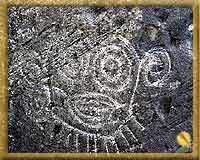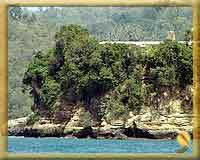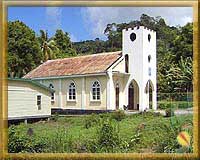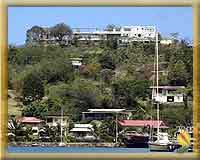|
GRENADA HISTORY FROM CARIBS TO SLAVERY AND FREEDOM |
|
Ancient Carib stone carvings: When Christopher Columbus sailed by Grenada in 1498, the island was already inhabited by the Carib Indians. The admiral dubbed the island Concepcion, but passing Spanish sailors found its lush green hills so evocative of Andalusia that they rejected this name in favour of Granada. The French then adapted Granada to Grenade, and the British followed suit, changing Grenade to Grenada (pronounced Gre-nay-da). |
 |
|
Although none of the European powers had any trouble naming the island, they found colonization a much more difficult prospect. For a century and a half, the Caribs repulsed all attempts at European settlement, until an enterprising French expedition from Martinique succeeded in purchasing extensive tracts of land in return for a few beads, knives, and hatchets. Hostilities between the Caribs and the French broke out almost immediately afterward, as the French endeavoured to extend their control over the whole of the island. |
 |
"Leaper's Hill": Determined not to submit to French rule, the Caribs fought a succession of losing battles, and ultimately the last surviving Caribs jumped to their death off a precipice in the north of the island. The French named the spot "Le Morne de Sauteurs," or "Leapers' Hill." |
|
For the next ninety years, the French struggled
unsuccessfully to keep the island from falling into the hands of the British.
Fort George and Fort Frederick, which still command the
heights overlooking St. George's harbour, are relics of that fight. Finally, under the
Treaty of Versailles in 1783, the island was permanently ceded to the British. |
|
In 1877 Grenada became a Crown Colony, and in 1967 it became an associate state within the British Commonwealth before gaining independence in 1974. Despite the island's long history of British rule, the island's French heritage (both colonial and revolutionary) survives in its place names, its buildings, and its strong, deep rooted Catholic faith. |
Saint Patrick's |
 |
 |
Hotel destroyed during conflict |
In 1979, an attempt was made to set up a socialist/communist state in Grenada. Four years later, at the request of the Governor General, the United States, Jamaica, and the Eastern Caribbean States intervened militarily. Launching their now famous "rescue mission," the allied forces restored order, and in December of 1984 a general election re-established democratic government. |
|
|
||